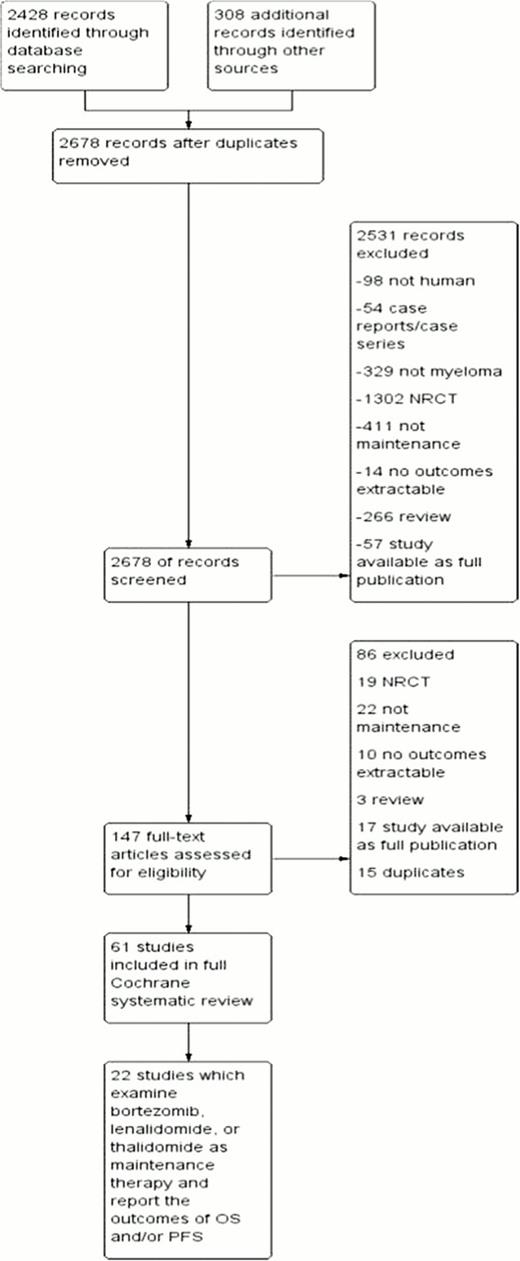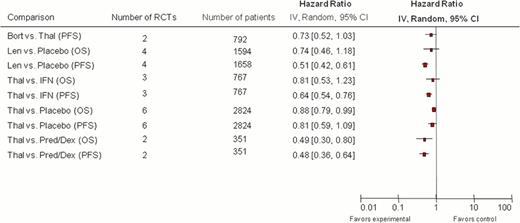Abstract
Abstract 4271
The role of various maintenance therapies in the management of MM is unclear and evidence on the efficacy of these regimens is conflicting. In order to provide the totality of available randomized evidence on the role of maintenance therapy in MM, we conduct a comprehensive systematic review and meta-analysis of all RCTs studying maintenance therapy. Here, we report the pooled results of trials which directly examined the novel agents of bortezomib, lenalidomide, or thalidomide and reported the outcomes of overall survival (OS) and/or progression-free survival (PFS).
A comprehensive literature search of MEDLINE (PubMed), the Cochrane Central Register of Controlled Trials (CENTRAL), and meetings abstracts from American Society of Hematology, American Society of Clinical Oncology, European Society for Medical Oncology and European Hematology Association was undertaken to identify all phase III randomized controlled trials (RCTs) of maintenance therapy published until July 2012. We extracted data on OS and PFS. Time to event data were pooled under the random effects model as hazard ratios (HR) and its corresponding 95% confidence interval (CI). Heterogeneity was assessed using the chi square test and I2statistic. All analyses were done in Review Manager 5.1.
Twenty-two RCTs met the inclusion criteria. (Figure 1) However, only data from the following RCTs were able to be pooled for the direct head-to-head comparison: 2 RCTs of bortezomib maintenance therapy enrolling 792 patients, 5 RCTs of lenalidomide maintenance therapy enrolling 1776 patients, 11 RCTs of thalidomide maintenance therapy enrolling 3952 patients. The pooled HR and 95% CI, number of RCTs, and number of patients for each comparison are presented in Figure 2. Only two trials compared the novel agents of bortezomib and thalidomide head-to-head. There was no significant different in terms of PFS. For the novel agent of lenalidomide, there was no significant difference is OS compared to placebo. The pooled PFS was in favor of lenalidomide maintenance compared to placebo. For thalidomide, OS was significantly in favor of the intervention when compared to placebo or prednisone/dexamethasone. There was no significant difference in OS between thalidomide maintenance when compared to interferon control. For the outcome of PFS, the pooled results favored thalidomide when compared to prednisone/dexamethasone or interferon control. There was no significant difference between thalidomide and placebo.
To date, the largest number of trials has been among thalidomide as maintenance therapy. In our meta-analysis, thalidomide is the only agent which improves survival compared to no treatment. Other novel agents have been evaluated in a smaller number of trials and current data does not allow for firm conclusions that any agent is superior to the other. An indirect, network meta-analysis is called for to provide additional insights regarding comparative efficacy of the novel agents as the maintenance treatment for MM.
Study Flow Diagram.
Pooled Results for OS and PFS.
No relevant conflicts of interest to declare.
Author notes
Asterisk with author names denotes non-ASH members.



